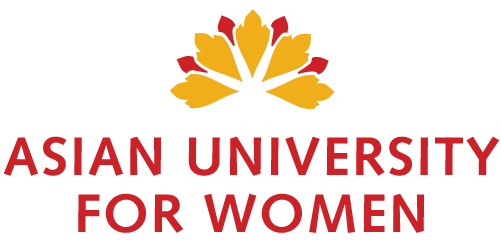The mountain remains unmoved by its seeming defeat by the mist – Rabindranath Tagore
Posted on June 30, 2022
Written by AUW
Chittagong, Bangladesh — June 30, 2022 — AUW’s fiscal year comes to an end on June 30, 2022 – just a few hours from now. We are writing to invite you to affirm your support for AUW with one more gift to the University before the books are closed for the year. This has been an unusually eventful, busy and productive year for us. The months ahead will continue to see rapid acceleration of our activities. We will need more support from you to keep up the pace of progress. Here we quickly provide you some highlights of what we have achieved in the past six months.
January 2022
After having shuttered our (physical) doors for the entire Covid 19 period, we reopened physical classes, bringing back to campus our students from 19 countries. Arranging travel of students from so many different places posed serious challenges. Our staff succeeded through a combination of diplomacy and guile, and virtually all students were ultimately able to reach Chittagong in time for classes.
It was not an easy decision to re-open the University, as the fog of Covid-19 still left many uncertainties. We prepared for re-opening by arranging for all students and other members of the community to be vaccinated and by instituting a strict regime of frequent testing of the entire community. Fearing that a sudden wave of new infections could overwhelm the entire local health care system, we created (with support from Cartier Philanthropy, Direct Relief and other generous donors) our own Covid Care and Management facility, fully staffed by medical and paraprofessionals. When the next Covid wave came, we were prepared: our Covid Care facility served nearly one hundred patients – although none were severely affected.
Wellesley College and AUW joined forces to host a virtual forum on Women Teaching Women, Women Learning from Women to reaffirm our global commitment to women’s education, particularly to those in Afghanistan. Luminaries from around the world joined in this call for action, including Former Danish Prime Minister Poul Nyrup Rasmussen, former US Secretary of State Hillary Rodham Clinton, AUW Chancellor Cherie Blair, Pakistan Federal Minister and AUW Trustee Sania Nishtar, UNHCR Deputy High Commissioner Kelly Clements, AUW Support Foundation Chair Jack Meyer, Wellesley College President Paula Johnson, former NYU President John Sexton and leaders of the private sector including Jean Hynes (Wellington Management) and Abigail Johnson (Fidelity).
Closing a near ten-year wait in starting construction of AUW’s purpose-built campus, designed by Moshe Safdie, AUW appointed a Project Director and a team of engineers to jump start its campus construction process. It is often difficult to appreciate the importance of infrastructure development, but in a setting where the “public grid” exists only marginally, having a “room of our own” makes all the difference. It also sends a signal to the world that women’s empowerment need not be limited to the rock-bottom of microfinance; in fact, talented women deserve the best education with the best faculty in the best facilities that they can get.
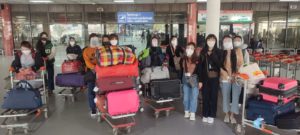

(Left) AUW students returned to Chittagong
(Right) Former US Secretary of State Hillary Rodham Clinton and Wellesley College President Paula Johnson speak at a virtual forum on Women Teaching Women, Women Learning from Women
February 2022
Early in the year AUW committed to re-launching our drive to recruit students across Afghanistan. As our prior recruitment networks were no longer available, we created a new team that worked around the country. Word of scholarships at AUW were spread from community to community. Thousands of applications were filed. Our admissions office staff worked relentlessly to review the applications, hold weekly admission tests in multiple provinces, and conduct personal interviews by WhatsApp or Zoom. The Government of Bangladesh provided Visas-on-arrival to all students, while the Government of Pakistan facilitated the movement of these young women by granting them transit Visas into Pakistan. 171 new students were then selected and moved from Afghanistan to Chittagong. Included in that group were 21 students who enrolled in AUW’s first graduate program – a two-year Masters in Education created with support from Johns Hopkins University School of Education, University of Manchester, Boston College School of Education and others. As many of the professors would teach from their home institutions, our IT department worked around-the-clock to equip classrooms with modern video and sound equipment, helping to overcome the distance that otherwise separated the professors and the students. Five of our own outstanding graduates with further degrees from Oxford, LSE, or Central European University joined to serve as Teaching Fellows, supporting the global faculty in the delivery of the classes, organizing review sessions, and leading section meetings. One instructor, Dr. Stefanie Panke from Johns Hopkins University, who taught a popular class on Design Thinking remarked that this was her best teaching experience.
During the same period, the AUW 148 – AUW’s Afghan students and graduates who were evacuated out of Kabul just prior to the political shift in Afghanistan – were placed in US universities. Legal teams were assembled to support their transition to residency status in the United States.
171 new students were recruited from 17 different provinces across Afghanistan – reaching communities in the country previously outside the bounds of AUW outreach. The arrival of the 171 new students caused a slight increase over the previous highest enrollment of Afghan students at AUW (160). A special effort was made to recruit new students from Rohingya refugee camps as well, with new enrollment from Rohingya camps reaching 100 for the first time. Some have asked why AUW has adopted such an extraordinary focus on students from Afghan and Rohingya communities. Our answer is simple: While there may be other communities that are functionally deprived of educational opportunities, these are the only two communities who have been legally barred from getting an education. Our Charter, as enacted by the Parliament of Bangladesh, implores us to respond to this anomaly by going extra lengths to provide them the opportunity that only AUW can. However, we are mindful of the fact that the AUW education is enriched by the diversity of this community. We will strive to continue to honor our commitments to having a truly diverse community as more and more students from other nations and communities join us.
AUW named Dr. Rubana Huq, distinguished poet, prominent business leader, and Visiting Fellow at Harvard and New York University, as Vice Chancellor. Dr. Huq is AUW’s first Vice Chancellor of Bangladesh nationality. She was joined by Dr. Beena Khurana (Cognitive Psychologist) and Dr. David Taylor (Historian) as deans.
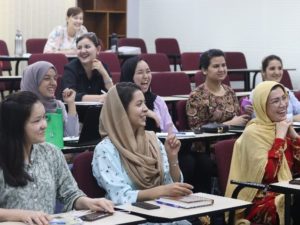
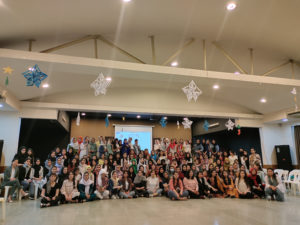
(Left) Students in Masters in Education program
(Right) 171 new students were recruited from 17 different provinces across Afghanistan
March/ April 2022
Spring is always the season that graduates wait anxiously for decisions on their graduate school application. While the data are still coming in, we congratulate the following students for their remarkable successes:
Paromita Basak, PhD at the University of Maryland Department of Geography
Tajkiya Ahmad, PhD at the University of Nottingham Department of International Relations
Antara Barua, PhD in Biomedical Engineering at the Carnegie Mellon University
Tanzila Ferdous, Masters at Uppsala University
Karishma-E-Tarannum, Masters in Environmental Engineering & Project Management at the University of Leeds
Zainab Begum, Masters in Epidemiology and Biomedical Data Science, at the University of Oulu (Finland)
Samiha Mannan, Masters in Water Science, Policy & Management at the University of Oxford
Suzana Salim, Masters in Gender & Development at the University of Sussex
Ukheng Marma, Masters in Linguistics, Massachusetts Institute of Technology (MIT)
Irfana Khatoon, Masters in Economic Policy in Global Markets at the Central European University (Austria)
Raisa Rahman, Masters in Agriculture & Resource Economics, Alberta University (Canada)
Monica Anjum Chowdhury, Masters at Johns Hopkins University
Sonia Akter, Masters in International Development Management at the University of East Anglia (UK)
Mya Hlwar, Master of Science Education, Educational Studies at Johns Hopkins University
Taslima Khanam, Masters in Public Health at the T.H. Chan School of Public Health at Harvard University
Fahima Ahmadi, Masters in Muslim Societies at the School of Oriental & African Studies (SOAS) (UK)
Samanta Sharmin, PhD in Public Policy & Administration at the University of Kentucky (USA)
Pema Yangzom, MPhil in Architecture & Urban Studies, University of Cambridge
Maisha Mehzabeen, Masters in Political Science at Illinois State University
Ugyen Tshomo, Masters in Marine Plastics Abatement at the Asian Institute of Technology (Thailand)
Afra Saiyara Haque, Masters at the University of Winnipeg
May 2022
An independent committee of experts evaluated bids from nearly ten contractors for starting construction of the AUW Campus Center. Based on a thorough technical and financial analysis of the bids, the Bangladeshi construction company Starpath was chosen to undertake construction of the first major building on the new campus. The chosen contractor has already mobilized its work force at the site and the necessary excavation work has made considerable progress in spite of the challenges of heavy rains. One kilometer of a boundary wall of trees and hedges have been planted out of the total perimeter of over four kilometers. Architectural teams from Sri Lanka have been invited to study possible conceptual designs of student and faculty housing.
To help manage gaps in the arrival of teaching staff to support the newly recruited students, West Virginia University, University of Delaware, and Northeastern Illinois University made special arrangements to offer supplementary synchronous classes for AUW students.
Our estimates for enrollment in the autumn now stands at 1600 from 20 countries, including our expected first significant ventures in Africa in collaboration with BRAC International. To accommodate these students and the attendant faculty and staff, AUW has rented nearly half a million square feet of new space and are currently refurbishing them for use as classrooms, offices, and student and faculty housing. Located just about a 10-minute walk from the current campus, the new space will be directed for undergraduate and graduate studies while the existing facilities will be devoted to the education of our much larger student body enrolled in General Studies, Pathways for Promise and Access Academy.

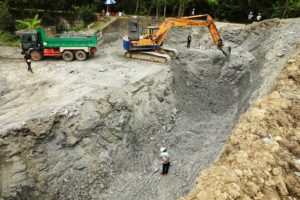
AUW Campus Construction started
The Lone Dybkjaer Foundation, named after the AUW Co-Founder and prominent political and civic leader in Denmark, was formally launched at an event in the Danish Parliament with food, music, gorgeous posters and inspirational speeches. Hosted by Lone’s husband, the three-time former Social Democrat Prime Minister of Denmark Poul Nyrup Rasmussen, the event brought all parts of Danish society and members of all political parties. Former Prime Minister Poul Rasmussen spoke eloquently about how “Lone may be no longer be with us, but through the work of the Lone Dybkjaer Foundation and its support of the Asian University for Women, Lone’s principles and visions of equality for all could be sustained.” Speakers included the Danish Education Minister Pernille Rosenkrantz-Theil (who attracted international attention during the pandemic for her far-reaching actions to bring back students to schools) and AUW Chancellor Cherie Blair.
Dr. Shopon Mollah, who introduced and leads the study of bioinformatics at AUW, was appointed as the Takeda Chair in Bioinformatics and Public Health. Professor Mollah holds a PhD in Molecular Biology from the University of Notre Dame and has previously held faculty positions at Yeshiva University in the U.S. We congratulate Professor Mollah for his devotion to research and learning at AUW and for assuming his new role as the holder of the Takeda Chair.
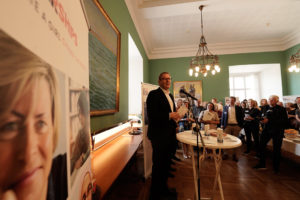
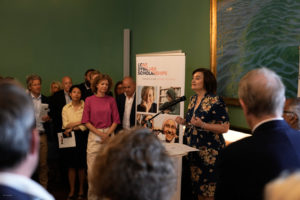
(Left) Former Social Democrat Prime Minister of Denmark Poul Nyrup Rasmussen launched the Lone Dybkjaer Foundation
(Right) Mrs. Cherie Blair, AUW Chancellor
June 2022
The month of June began with extreme sadness on campus. Zahra Hussaini, an Afghan student who arrived to campus only in February this year, was reciting a poem she composed herself at a meeting of the Anthology Club when she suddenly collapsed and lost her life. It is never easy to lose a precious member of any community, but Zahra’s loss stopped all life for days on campus. She was a vibrant and optimistic young woman who loved learning. Her family has now laid her to rest her in their home in Bamiyan, Afghanistan. We will never be able to bring Zahra back, but we will also never lose sight of her spirit and her outsized courage. In honor of Zahra’s memory, an annual full scholarship named after Zahra Hussaini has been established. The scholarship recipient will be identified at Commencement each year.
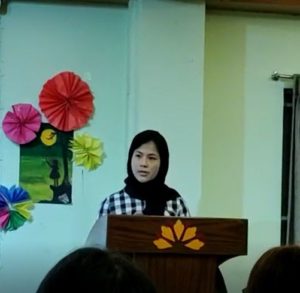
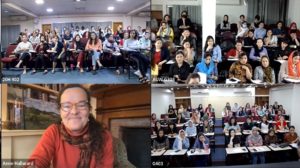
(Left) Zahra Hussaini
(Right) AUW hosted a 12-week mental health lecture series organized by Dr. Anne Hallward, MD.
This month, AUW also hosted a 12-week mental health lecture series organized by Dr. Anne Hallward, MD to offer students more holistic and communal opportunities to learn about mental health and make support services more accessible. Particularly geared towards Afghan and Rohingya students who newly arrived to campus, the lectures spanned many topics across the mental health field and provided chances for interaction through Q&As and a final session devoted to collective songwriting. We were pleased and grateful to host the following mental health experts as lecturers:
Anne Hallward MD, Usha Tummala-Narra Ph.D., Dick Schwartz Ph.D., Sue Jones, Elissa Ely MD, Deirdre Fay LCSW, Barbra Esher, Judith Herman MD, Theresa Betancourt Sc.D., Sonia Ancoli-Israel Ph.D., Deb Dana LCSW, Martha Gonzalez Ph.D
Like all lives, ours at AUW have had a mix of both triumphs and irredeemable grief. The main solace we have in all these efforts is our institution’s unshaken belief in women’s education and empowerment as a key path to overcoming all struggles. We invite you to join us in this endeavor by making a contribution to our work today.
To donate: Please visit https://asian-university.org/donate/ to make a gift securely by Visa, MasterCard or American Express.
You may also donate by check, made payable to the Asian University for Women Support Foundation.
To donate via Wire, Stock, or Donor-Advised Fund Donations, please contact give@asian-university.org.
